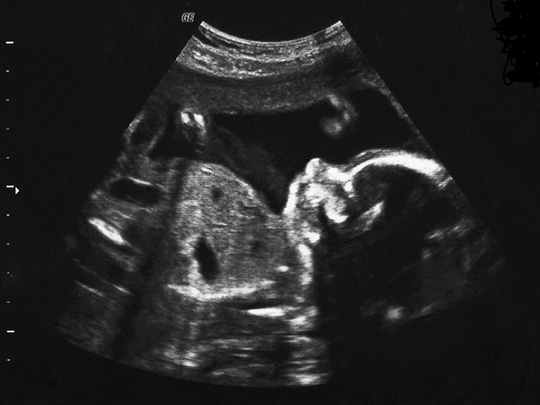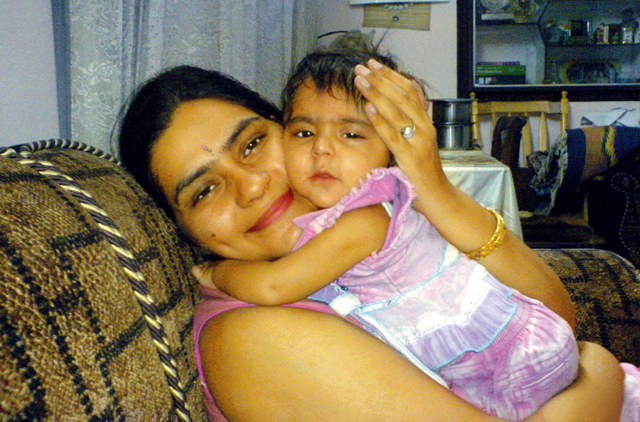
Clutching husband Rajesh*’s hand, 20-year-old Nilima* stares at a monitor displaying grainy black and white swirls. She’s 20 weeks pregnant and they’re in a small clinic in Jaipur, the capital of the western Indian state of Rajasthan, about to see an image of their unborn baby for the first time.
Her husband has his eyes glued to the monitor as the doctor examines the foetus’ heart and vital details to check it’s growth and health. But there’s one thing Rajesh, a businessman, wants to know more than anything else – the sex of their child.
When the scan is over, the doctor leads Rajesh and Nilima to his office where he gives them the news – their unborn baby is a girl. The disappointment on both the parents’ faces is evident. While Nilima’s eyes well up because she knows what her fate and that of her unborn child will be, Rajesh quietly takes the doctor to a corner of his office.
Seeing both of them speak in hushed tones, Nilima knows what is being discussed: an abortion. She is reluctant to undergo one, but she knows she will be forced to by her husband and his parents.
They all want a boy. If she protests, she will be tortured until she agrees, or forced by other means to get rid of the child growing inside her. And if, by some luck, she does have the child, the chances of it being allowed to live would be thin – it would very likely be killed.
Sadly Nilima is not alone. Thousands of pregnant women in India are reportedly forced by their husbands and in-laws to undergo sex-determination tests, and if the foetus is found to be female, get it aborted.
Outside the law
While determining a foetus’ sex is illegal in India, several clinics across the country surreptitiously agree to conduct tests and reveal the sex of the foetus for a price. Depending on the kind of clinic and the location, the cost for determining the sex varies from Rs3,000 to Rs8,000 (Dh201 to Dh537), say campaigners.
According to some reports, there are as many as 40,000 registered ultrasound clinics in India and very likely as many, or more, that are unregistered. Apart from determining the sex, several of these clinics also offer to terminate the pregnancy, again an act that is illegal.
The law has been tough on occasion. In July last year, 12 doctors were suspended for reportedly conducting prenatal sex tests in Jaipur, while in August three in-laws of a pregnant women were arrested for allegedly torturing her in an attempt to convince her to go for a sex-determination test in Kolkata.
Of course, there have been instances when women have refused to be cowed down and have gone ahead and had girl children. Dr Mitu Khurana is one of them. A New Delhi-based paediatrician, she looks at her twin daughters Guddu and Pari, who are now seven, and embraces their happy, smiling faces.
She can’t remember a minute of her life before they were born; they now complete her. She claims she was forced by her husband and his family to undergo a scan while she was pregnant, and when it was found she was carrying girls, they told her to get rid of them.
But she refused to give in and went ahead and had the children. When relations soured, she decided to return to her parents’ home, keen to bring up her children in a safe and secure environment.
But such cases are more an exception than the rule if the most recent – 2011 – census figures are any indication. Sex ratios have declined in 17 states in the past decade, with the biggest falls registered in Jammu and Kashmir.
In 1961, for every 1,000 boys under the age of seven, there were 976 girls in India. Today, the figure has dropped to 914 girls per 1,000 boys. According to reports, India’s ratio of young girls to boys is one of the lowest in the world after China. Social activists say the decline is largely due to the increased availability of sex screening.
Foetuses apart, girl children, too, have not been spared. The media has been unrelenting in highlighting the ghastly practice of female foeticide as well as killing of female children.
The recent case of three-month-old Afreen, who died in April last year in Bengaluru, southern India, following severe injuries she sustained including bite marks, cigarette burns and a dislocated neck, was a case in point. An incident that shocked the nation, the little girl’s case underscored the need for more stringent laws to curb the practice.
The baby’s father was reported to have told his wife Saira Banu, that he wanted a boy. Girls, he reportedly said, were too expensive. He is under arrest, accused of beating the baby to death.
Police say he confessed to the killing. In a seminar conducted in New Delhi in 2006, MP Renuka Chowdhury, who was the Minister for Women and Child Development at the time, said many newborn girls were killed by pouring sand or tobacco juice into their nostrils, referring to cases in the western desert state of Rajasthan where gender imbalance is highly skewed in favour of boys.
“They bury infants into pots alive and bury the pots. They put tobacco into girls’ mouths. They hang them upside down like a bunch of flowers to dry,” she said, listing ways female children were killed.
The fall in the number of females has cost India 1 per cent of its GDP and has created shortages of girls in some states like Haryana where, in one case, four brothers had to marry one woman, she added. Last year the local government in Rajasthan decided to set up seven new courts for the speedy resolution of pending cases related to sex determination centres.
This was in the aftermath of a shocking television series hosted by Bollywood star Aamir Khan titled Satyamev Jayate (Truth Only Triumphs), which laid bare the prevalence of illegal gender determination clinics in India. In fact, the star met the Rajasthan Chief Minister Ashok Gehlot last year with a plea that the state government establish more courts to try sex-determination test cases.
‘A national shame’
The central government has been working to stop the practice of killing girl children. Prime Minister Manmohan Singh has gone on record to describe female foeticide and infanticide as a “national shame” calling for a “crusade” to save girl babies. Laws are also in place to prevent such acts.
In 2011, the National Crimes Record Bureau in India declared that the Indian police had received almost 100,000 cases of cruelty towards women by their husband or relatives, and more often than not these cases were related to they carrying female foetuses.
An example is Uttar Pradesh where, according to some reports, over 1,500,000 unborn girls are killed every year. Incidentally, ultrasound and in vitro fertilisation centres have doubled in the state – from about 400 in 2001 to over 4,000 in 2010.
Two laws that prohibit the sex selection of a foetus in India are the Medical Termination of Pregnancy Act (MTP), 1971, amended in 2002, and the Prenatal Diagnostic Techniques (Regulation and Prevention of Misuse) Act, 1994, amended in 2002.
The former prohibits abortion except only in certain medically necessary situations, while the latter prohibits the sex selection of a foetus with a view towards aborting it.
Under the Indian Penal Code, causing an abortion, even if caused by the pregnant woman herself, is a criminal offense, unless it’s done to save the life of the woman. The offense is punishable by imprisonment for a period of three years, a fine, or by both. But despite this, the number of girl children being killed before and after birth is rising.
The United Nations estimates as many as 200 million girls are missing in the world today because of gendercide. In a report by the Lancet, the world’s oldest and most respected medical journal, over a 20-year period, ten million female foetuses have been aborted in India.
Debt due to daughters
There are many reasons for the prevalence of this horrific practice. In India, with a population of 1.2 billion, daughters are still seen as a burden on families and finances. In traditional Indian families, the bride goes to live in the groom’s house and is expected to look after all the needs of her in-laws.
So couples prefer having male children so they will bring home a wife to look after them in their old age. Also, a girl’s family can end up deep in debt paying a dowry to secure her marriage, not to mention arranging for all the wedding expenses and purchasing the gold jewellery she is expected to wear on her wedding day.
Although outlawed in India in 1961, the dowry system is still common and takes different forms where some families give away money and gold, while others give land, motor vehicles and sometimes even fully furnished houses. This contributes to the cultural preference for boys.
Economic progress has not necessarily changed traditions of gender discrimination, as Mitu’s case proves. Mitu, now 36, from Delhi, married Dr Kamal Khurana, an orthopaedic specialist, in November 2004, in an arranged marriage. Two months later, she was pregnant. She didn’t care if it was girl or a boy; she was just elated to be having a baby.
The family was thrilled and an ultrasound six weeks later revealed she was carrying twins. Mitu belongs to a well-to-do family where her father worked as a surgeon and her mother also worked in the health service.
“I was so excited. I had always wanted to be a mother and having twins was even more exciting. I couldn’t wait to hold my babies,’’ Mitu exclusively tells Friday. But as weeks passed it became evident that Mitu’s mother in-law did not share the same excitement. She began to suggest Mitu take a sex-determination test, even though it is illegal.
As time passed, Mitu began to feel slightly uncomfortable in the family home. At every opportunity, her mother-in-law insisted if the babies were girls they’d be a burden. When she was four months pregnant, Mitu fell down the stairs.
“It was a bad fall, and I started bleeding,’’ she says, alleging that her in-laws delayed taking her to the hospital. Eventually, Mitu called her father for help and she claims he threatened Mitu’s in-laws with the police if they didn’t take her to hospital immediately, which they did.
Four weeks later, when Mitu was 20 weeks pregnant, she fell ill. Without realising, Mitu, who is allergic to eggs, had eaten a cake made with eggs prepared for her by her mother-in-law. In a devastating twist of fate, while Mitu was ill and lethargic in hospital, her husband and in-laws reportedly persuaded the doctor to do an ultrasound scan and it was confirmed she was carrying twin girls. When Mitu found out what had happened she was devastated.
In August 2005, she gave birth to her daughters, Guddu and Pari. One afternoon, while Mitu was in another room, she says one of the twins fell down a flight of stairs in their stroller – another incident she believes was not an accident.
Thankfully, the twin was unharmed but it was enough for Mitu to pack her bags for good and leave her husband. She is now trying to rebuild her life as a single mother. “As an Indian woman I was frowned upon – social pressures dictate women never leave their husband – but I didn’t care. I had to protect my daughters.
Mitu finally decided to fight her husband and in-laws for the sake of newborn daughters everywhere, with the help of campaign workers. She reported her husband and mother in law and they were charged under the Preconception and Prenatal Diagnostic Techniques Act of 1994.
She also made a formal complaint against the hospital for breaking the law and doing a sex-determination test. For the last six years Mitu has campaigned tirelessly against gendercide with the help of Campaign Against Female Foeticide, Centre for Social Research and, most recently, has been a part of a documentary film, It’s a Girl.
Mitu says, “I am determined to get justice. This cannot go on, we’re in a modern world but we still live by old traditions. I had to quit my job because of the pressure. But I will not withdraw the case against my husband and mother in-law.” Dr Kamal Khurana, her ex-husband, however, denies all the allegations. “She does not want to live with me so she can do whatever she likes. But ....everything that she says is false.’’ he said.
Mitu says, “I’m still working with my lawyer to make sure our case gets to court, but the Indian legal system is slow. It could take ten years, but I will not give up until justice has been done."
* names changed to protect identity. With additional inputs from Anand Raj, Features Editor












